Hollywood & Spine Archive: Little (Men in) Black Book
An overview of the novelization to MEN IN BLACK, originally published in July 2022.
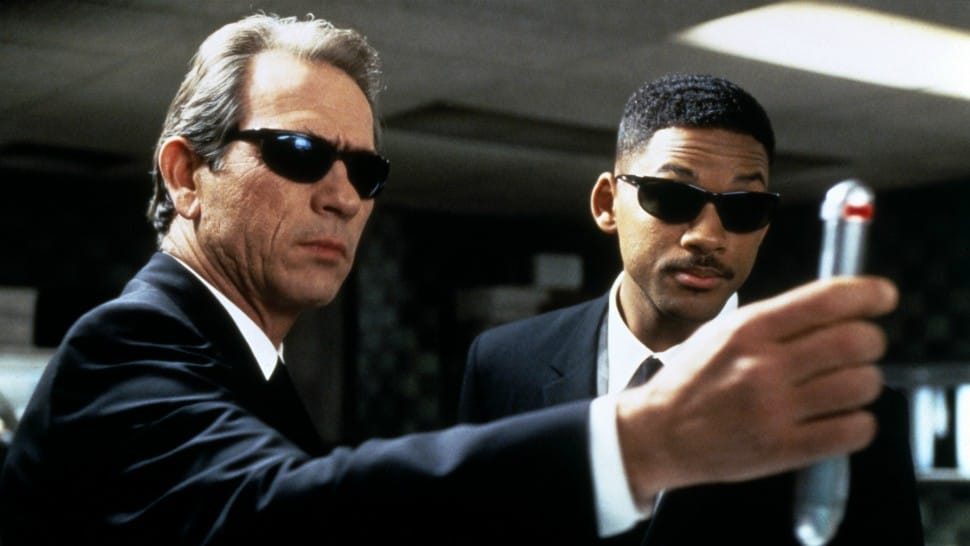
This is exactly the kind of novelization I go for: a solid retelling of a movie with enough aesthetic differences and deleted "footage" to make it interesting. Amazingly, not all of the Men in Black films got novelizations, but this doesn't shake out the way you might think. 2002's Men in Black II did, and 2019's lackluster Men in Black International did, but not the third film, released in 2012. (Given the production nightmares on International - which even this article doesn't cover in as much depth as I've heard - I'd love to see how that novelization reads.) (originally published 7/7/2022)
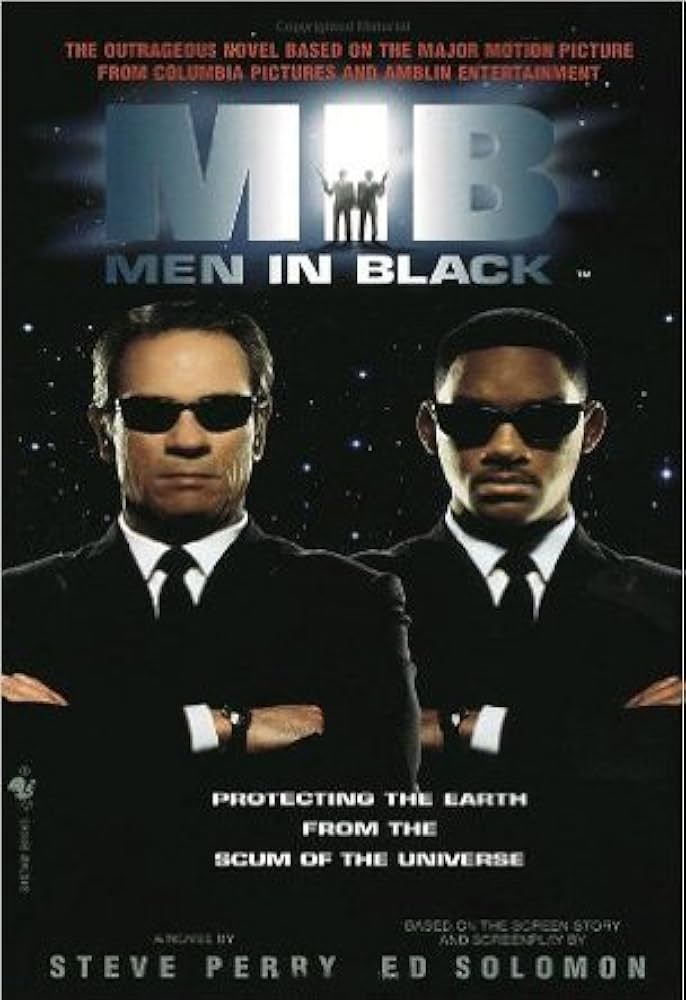
Men in Black by Steve Perry (based on the screen story and screenplay by Ed Solomon) (Bantam, 1997)
The pitch: Loosely based on a cult comic (distributed at the time by Marvel), this sci-fi/comedy classic follows two agents in an ultra-secret agency monitoring alien activity on Earth.
The author: Not to be confused with the best-known voice of Journey, Steve Perry is a master of sci-fi/fantasy works and adaptations. His CV includes tie-in novels for Star Wars (including Shadows of The Empire, this author's personal favorite), Conan, Aliens and Indiana Jones; episodes of The Real Ghostbusters, Batman: The Animated Series and Gargoyles; and a small handful of novelizations - the first of which was The Mask, covered by Hollywood & Spine before.
The lowdown: Unintentionally or not, Men in Black became a sort of Ghostbusters for the '90s. Both were distributed by Columbia Pictures, and feature high concept sci-fi/comedy storylines, a strong visual aesthetic and eye-popping visual effects, hilarious performances working from snappy scripts, a well-liked pop theme song, a cartoon spin-off, theme park attractions and multiple film sequels that are all between middling to bad. All in all, MiB is a prime candidate for the novelization process - and it does one of the funnier things an adaptation can do: a top-down dialogue rewrite.
What? It's honestly not that much of a surprise, but if you've read enough novelizations, you might realize it's kind of a common theme. These books, as a practice, are sometimes like overhearing someone at another table in a restaurant describe the film in detail. With usually no chance to see the film in motion, authors don't always capture the kinetic nature of the story - but the dialogue is usually the most notable to twist from page to screen back to page.
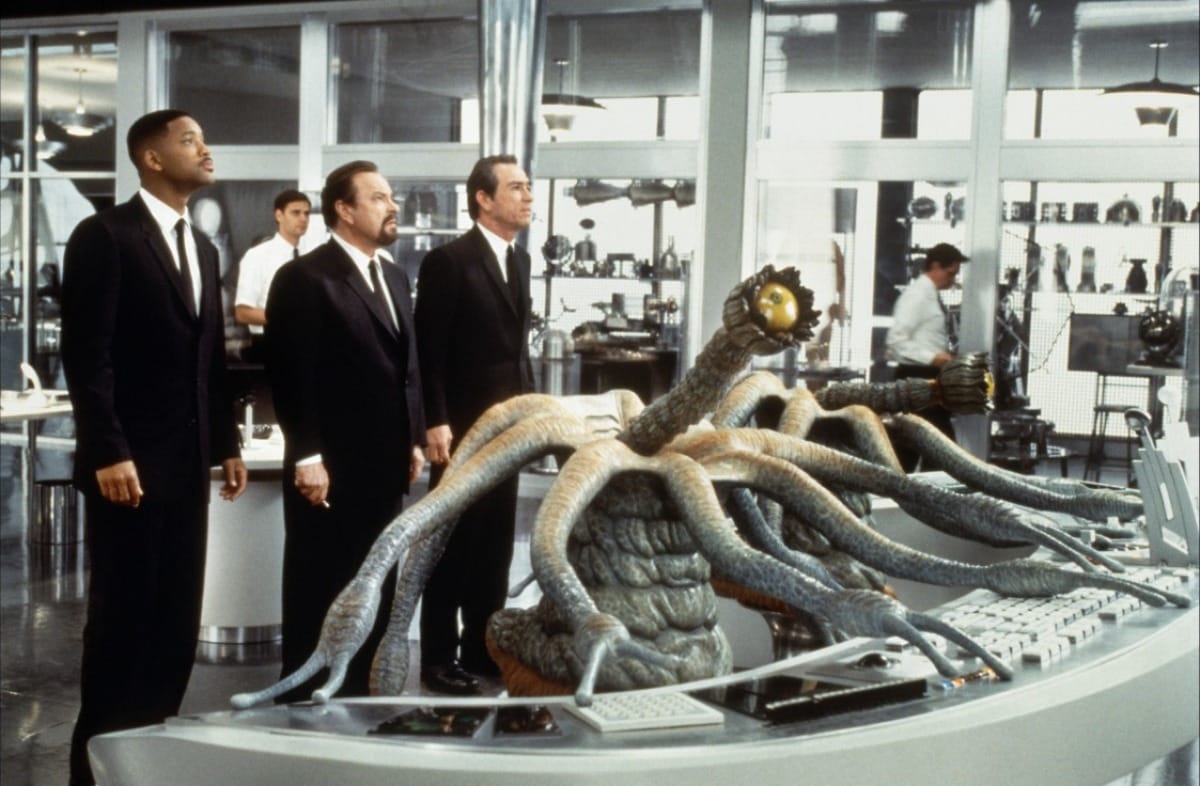
That's no surprise - actors try different reads, improvise things on set, or dialogue gets rewritten whole cloth. MiB was reportedly no different: Ed Solomon's script was hammered into a much lighter take than the dry, occasionally dark tone the original comic took. (David Koepp, who co-wrote the scripts to Jurassic Park and Mission: Impossible, was reportedly the one to refine it.) But the result is a shaggier version of familiar moments. Take the classic zinger when J (Will Smith) suits up as an MiB agent. In the book, it reads like...this:
Jay touched his tie, slipped the shades on, and smiled at Kay. "See, the difference between you and me? I can pull this off. I look good. You look like one of the Blues Brothers with a hangover."
Kay shook his head. "A vision of sartorial splendor, all right."
"That's me. Let's rock and roll."
Hoo boy. If that was what the movie sounded like, we probably wouldn't be talking about it 25 years later. But don't take that as a condemnation of Perry's adaptation skills! He does a terrific job adapting the main story and nailing the distinctive style and tone of the picture in literary form. He also adds a lot of fun, geeky material that deepens the lore of the Men in Black experience. The villainous bug that takes over the body of upstate farmer Edgar is named Kerb, the freewheeling worm guys in the MiB office are called Vermars, and the saucers at the 1964 World's Fair grounds in Queens were gifted by a race called the Permians, who apparently make terrible music. There are nice little asides to J's early upbringing (a Pennsylvania native, just like Smith) and even the medical examiner Laurel Weaver (inspired to work in postmortem medicine after a traumatizing experience with an older brother torturing a Barbie doll).
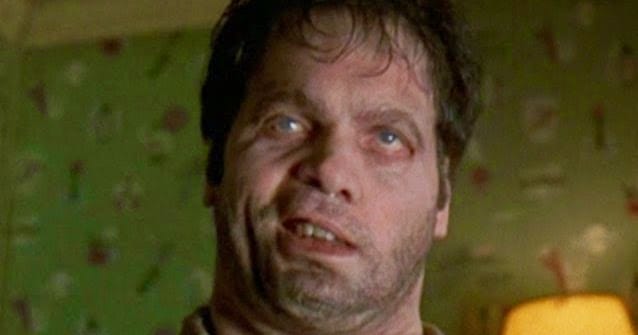
Perhaps best of all are his incredibly colorful descriptions of alien dialogue. Mikey, the alien disguised as a Mexican immigrant, "sounded like a combination of a lizard eating a moth and a jar full of angry wasps." The worm guys sound "like a cross between Esperanto and microphone feedback," while the twin aliens running the MiB control console "made noises like leaky tire valves." It's a fun recurring bit that never loses its luster!
If there's any misstep, it's making Agent K a bit more sardonic than the bone dry delivery Tommy Lee Jones gave him. (Apparently, this was a source of conflict between director Barry Sonnenfeld and the actor, who really wanted to try being broadly funny. Luckily, by not doing so, he was funnier than anything Hollywood could dream up.)
The cutting room floor: There are a few minor gags here and there that were probably (wisely) shorn before filming really got going. K's "Ford P.O.S." is shown to have an alarm system that disintegrates would-be thieves, and MiB leader Zed has an assistant named Dave who is capable of shifting time and space. The fact that the Edgar-bug is capable of talking to and taunting J (thanks to a universal translator) during their final battle is probably a vestige of the climax's original tone, which was going to feature a lengthy, existential debate between the agents and their foe. (An animatronic enemy designed by Rick Baker - who'd win an Oscar for the film's killer makeup - was scrapped in favor of the CGI crawler you see in the final cut.)
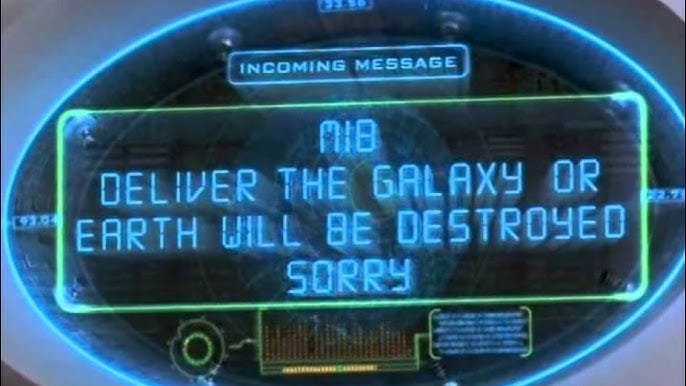
The book does, however, include one of the film's most significant last-minute alterations. The central conflict was meant to take place between two species of aliens: the Arquillians and the Baltians. (The tall alien played by the Twin Peaks guy was meant to be one of the latter.) The exchange of the film's MacGuffin - "the galaxy" - was meant to end their centuries-long conflict, and when the Bug ruins those plans, two warships descend on Earth, haplessly caught in the middle. The Baltians were ultimately deleted in post-production, an opportunity made possible by most of the dialogue about them being delivered by a CGI-assisted talking dog.
The presence of this narrative difference does welcome a really funny aside: why don't the MiB simply inform both species about the presence of Edgar, J asks? Turns out the universe has a pretty low opinion of Earthlings, thanks in part to several intergalactic visitors getting fleeced on our planet by opportunists. At various points in history, aliens attempted to buy the Brooklyn Bridge, the Eiffel Tower, the Chrysler Building (an attempted takeover by a Vulvarian nearly caused "an all-out war"), and even some swampland in Florida...which Earth quite possibly got quite a deal out of.
The last word: Men in Black succeeds just as nicely as a book as it did as a movie - even if the cut of the suit is a little different. Now, if you'll just look right here, we'll explain even more...
